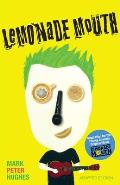Making Lemonade Mouth a Little Sweeter
I heard an interesting publishing story at last week’s SCBWI New England conference. Mark Peter Hughes originally published Lemonade Mouth as a young adult novel in 2007. This story of a teen-aged band got good reviews, and Mark and his family toured the country to promote it.
Earlier this year the Disney Channel unveiled its adaptation of the book to big audiences. Even a moderately successful television show reaches more people than solidly successful book by multiple orders of magnitude, and the Lemonade Mouth movie was more than moderately successful. It may not be a High School Musical phenomenon yet, but it attracted a lot of Disney’s core viewers.
The only problem is that those core viewers aren’t “young adults”—they’re tweens, and possibly tweenwannabes aspirants. What would those readers find when they looked for Lemonade Mouth in bookstores? What would their parents find?
Mark and his publisher decided to tweak the text for the book’s likely new readers as they reissued the paperback. The adaptations seem small—nothing to the plot, little to the language. The result is, I suppose, a “Disney version,” but it also speaks more directly to most tweens’ interests. It may also reflect a future of authors tailoring books to different readerships, something that digital formats will make even more economic.
Still, I can’t help but wonder if sixth-graders will whisper to each other to check out the library’s old hardcover copy of Lemonade Mouth.
Earlier this year the Disney Channel unveiled its adaptation of the book to big audiences. Even a moderately successful television show reaches more people than solidly successful book by multiple orders of magnitude, and the Lemonade Mouth movie was more than moderately successful. It may not be a High School Musical phenomenon yet, but it attracted a lot of Disney’s core viewers.
The only problem is that those core viewers aren’t “young adults”—they’re tweens, and possibly tween
Mark and his publisher decided to tweak the text for the book’s likely new readers as they reissued the paperback. The adaptations seem small—nothing to the plot, little to the language. The result is, I suppose, a “Disney version,” but it also speaks more directly to most tweens’ interests. It may also reflect a future of authors tailoring books to different readerships, something that digital formats will make even more economic.
Still, I can’t help but wonder if sixth-graders will whisper to each other to check out the library’s old hardcover copy of Lemonade Mouth.



No comments:
Post a Comment